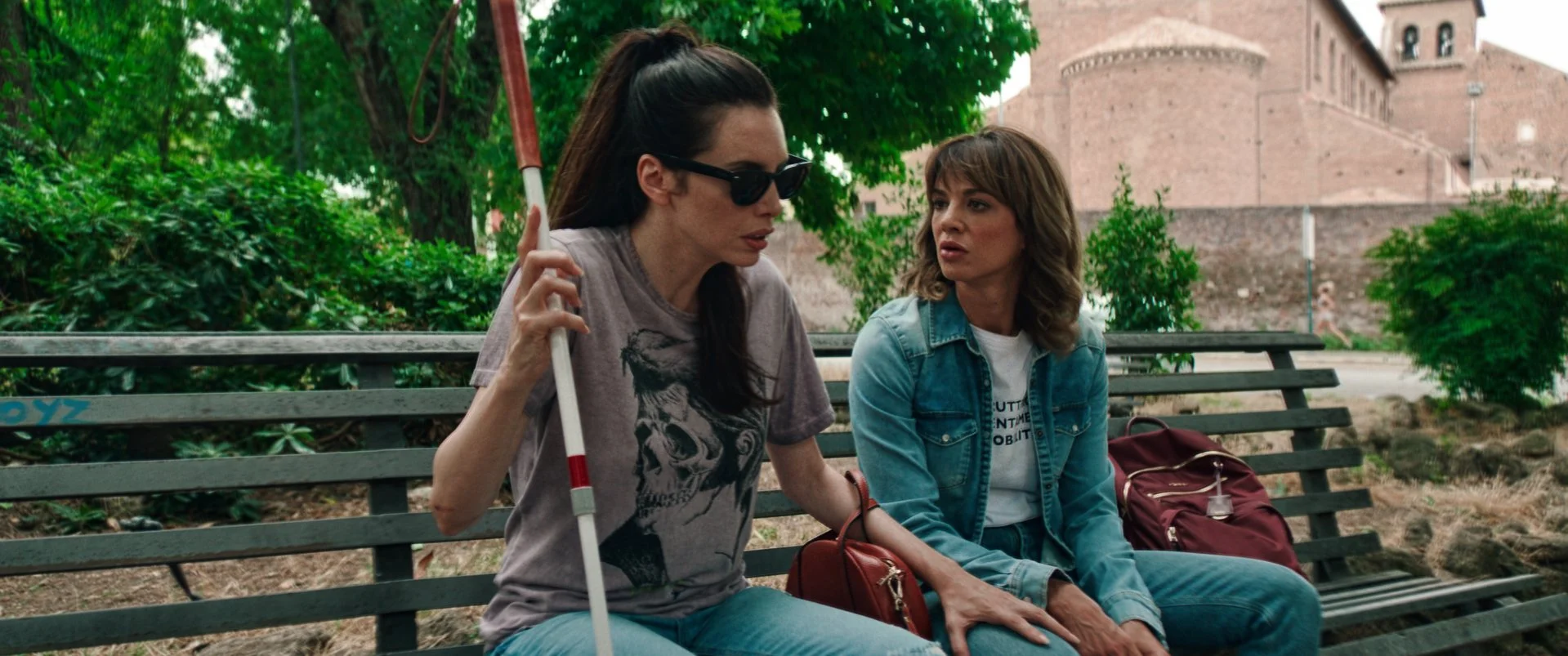DARK GLASSES sees Dario Argento take a step back towards the dark
Directed by Dario Argento
Written by Dario Argento and Franco Ferrini
Starring Ilenia Pastorelli, Asia Argento, and Andrea Gherpelli
Unrated
Runtime: 87 minutes
Opens in NY and Los Angeles on October 7, available on Shudder October 13
by Clayton Hayes, Staff Writer
Dark Glasses (aka Occhiali neri) is the first film of Italian horror maestro Dario Argento since his 2013 vampire feature Dracula 3D, which would have been an unfortunate way for his career to end. Argento is, to me, one of the greatest filmmakers of all time, but even I have to admit that his output from 1993’s Trauma onwards has been a long decline (barring 2001’s Sleepless). I am happy to say that, though not a great film, Dark Glasses is a significant step in the right direction and is easily the director’s best work since Sleepless.
Before I get too far ahead of myself, though, it’s important to recognize that there are two ways I approached viewing this film: Dark Glasses as an individual work of filmmaking and Dark Glasses as it fits into Argento’s existing body of work. If it’s not already evident from my opening paragraph, there’s some tension between these considerations of the film. I don’t want to turn this into two separate reviews of the film, that’d be more than anyone would want to read and I doubt I could pull it off, anyway.
Glasses has a retro Euro-thriller setup that feels of a piece with Sleepless, which is unsurprising as this film’s screenplay was originally written around 2002: sex workers in Rome are being murdered by a serial killer and our protagonist, Diana (Pastorelli), is the survivor of the most recent attack. In the course of escaping the killer her car is rammed through an intersection, resulting in a head wound that leaves her blind and kills the parents of a young boy, Chin (played by Andrea Zhang).
I’ve written previously about Argento’s interest in characters that are, for one reason or another, on society’s outskirts. He has also frequently centered his films on “odd couples” brought together by violence; this was usually violence witnessed by our lead characters that they feel compelled to investigate but, as time has gone by, the inciting act of violence has crept closer and closer to our protagonists. In Glasses it is the blinding of Diana and the death of Chin’s parents that brings the two of them together, more for emotional support and survival than any need to investigate who is behind the killings. In fact, unlike nearly all of Argento’s previous thrillers, Glasses never seems to worry about the “mystery” of the killer’s identity.
It’s an important philosophical distinction that leads inevitably to the film’s greatest narrative weakness, its complete lack of interest in the killer and their motivations. Argento’s killers have always had reasons for doing what they do, for the choices they make. Even if their reasons were silly (witches!), even if they didn’t entirely make sense (a nursery rhyme!), they existed to give meaning and weight to what was captured on screen. Stripped of any meaning, the killer in Glasses is essentially just a plot device and, narratively speaking, that just isn’t very interesting or satisfying.
This isn’t the only misstep; Diana’s characterization as a sex worker does not benefit from having been authored by 60-something white man in the early 2000s. Pastorelli manages well, though, with a performance that skews a bit melodramatic and keeps the film from becoming too overly dour. Asia Argento, who receives second billing despite very little screen time, is quite pleasantly understated as social care worker Anita. It’s a genuinely normal role, a fact which should come as a relief to those familiar with past collaborations between her and her father Dario.
I wish I had more of an understanding of how Argento’s cinematography has changed over the years. He’s rarely stuck with a DP or cinematographer for more than a couple films, so it was always my assumption that he was behind the visual language that many of his films share. Glasses, like much of Argento’s later work, just doesn’t have the same visual impact, and I don’t feel equipped to say how or why. It feels stark and lacking in intimacy, and the motions of the camera feel less engaged and less engaging. Is it a lack of comfort shooting on digital? Is it because his camerawork has become such a part of the visual lexicon that it just doesn’t hit the same way that it used to?
I’d love to hear your thoughts! Give Dark Glasses a watch on Shudder (or, if you’re lucky, in a theater) and let me know.

